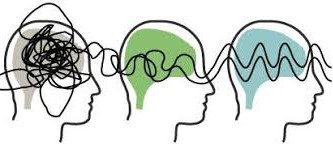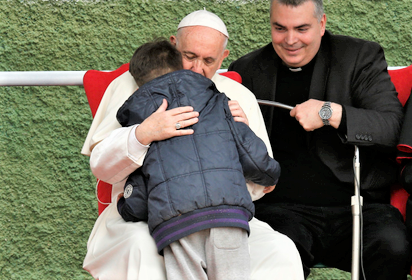The Seventh Sunday in Ordinary Time
For the last few Sunday’s, readings from the Gospel of Matthew, noted for its strong emphasis on Jesus the Teacher, have emphasized what has come to be called “the sermon on the Mount.”
In this famous address Jesus does presents two different ways of viewing life:
On one hand, Jesus presents a “business as usual” or the “way of the world” wisdom.
On the other hand, Jesus presents the wisdom of the Gospel, the wisdom of imitating the unbounded love of the Father for all people, for everyone.
The first way, the way of the world, follows the wisdom of “You have heard it was said.”
The second way follows the wisdom of “but I say to you” – the wisdom of the One who poured himself out in a total gift of love; the wisdom of the One who pointed to a different way of seeing and a different way of living.
It reminds me of Robert Frost’s famous poem “The Road Not Taken.”
In it he writes about two choices, the two roads open to him, and to all of us:
“Two roads diverged in a yellow wood,
And sorry I could not travel both
And be one traveler, long I stood
And looked down one as far as I could
To where it bent in the undergrowth ….”
The Gospel today, like the last few Sundays, presents the same two choices:
The choice of what our culture tells us, or the choice of being like our God.
For example, our culture tells us:
Happy are those who enjoy power because they will be in charge and can lord it over others.
Jesus says:
Happy are the humble, because they will inherit the earth.
Our culture tells us:
Happy are those who can sit in judgment over others, because they can boss people around and feel important and superior.
Jesus says:
Happy are the people who show mercy, because they will receive mercy.
Our culture tells us:
Happy are people who can overpower their opponents, because they will be seen as winners.
Jesus says:
Happy are those who beat their swords into plowshares, who make peace, because they will be called God’s children.
“You have heard it said … but I say to you.”
Today’s Gospel, however, goes even further and makes perhaps the most radical challenge of all … arguably the most significant and important directive that Jesus ever gave us:
“You have heard that it was said, ‘An eye for an eye and a tooth for a tooth.’ But I say to you, offer no resistance to one who is evil ….
“You have heard that it was said, you shall love your neighbor and hate your enemy. But I say to you, love your enemies and pray for those who persecute you.”
To be sure, when Jesus speaks of love of enemies, he is not thinking about affectionate feelings, about passionate love, or even about necessarily “friending” them on Facebook. As one scripture scholar describes it is that Jesus is talking about “a radically human relationship of positive concern for the enemy as a person.”
This same scholar goes on to say:
“It’s not enough to denounce terrorism. It’s not enough to show our horror and repulsion at every attack on human life. We have to work day by day to build a different society, uprooting ‘an eye for an eye and a tooth for a tooth,’ and cultivating an attitude of reconciliation that is difficult but not impossible to achieve.”
In other words, we must change our culture. We must raise the bar in our society. We must do whatever we can to promote peacemaking over violence. We must start believing that evil is overcome with good, not with a stronger version of evil.
We must, Jesus is telling us, break the cycle … break the cycle of vengeance and violence within your own family; break the cycle with the person at work or the neighbor next door; break the cycle wherever you find yourself sinking into anger and rage.
Christians – followers of Jesus – are called to love to the extent our heavenly Father loves us. We are called to reflect and imitate the character of God.
The sermon on the Mount is the ultimate catechism.
That’s what it was for Gandhi – and he was not a Christian. But after meeting Jesus in the Gospel, he wrote:
“Reading the whole story of this life … it seems to me that Christianity has yet to be made real … Until we have uprooted the violence of civilization, Christ has not been born yet.”
Let’s birth him – in our hearts and in our lives.
Let’s live out of the realization that Martin Luther King, Jr. made so clear when he said that “the great defect of violence is that it causes a vicious circle that destroys everything it creates. Instead of reducing evil, it increases it.”
Let’s together allow Jesus’ message to saturate our hearts to such an extent that it helps our culture believe that we cannot struggle against evil by destroying persons. We must combat evil without seeking the destruction of the adversary.
Which brings us back to the conclusion of Robert Frost’s poem:
“I shall be telling with a sigh
Somewhere ages and ages hence:
Two roads diverged in a wood, and I – I took the one less traveled by,
And that has made all the difference.”
We all have the same choice before us:
The culture of the world as we know it, or the culture of Jesus and the Gospel – the road less traveled.
Which road will you take?
That will make all the difference.





